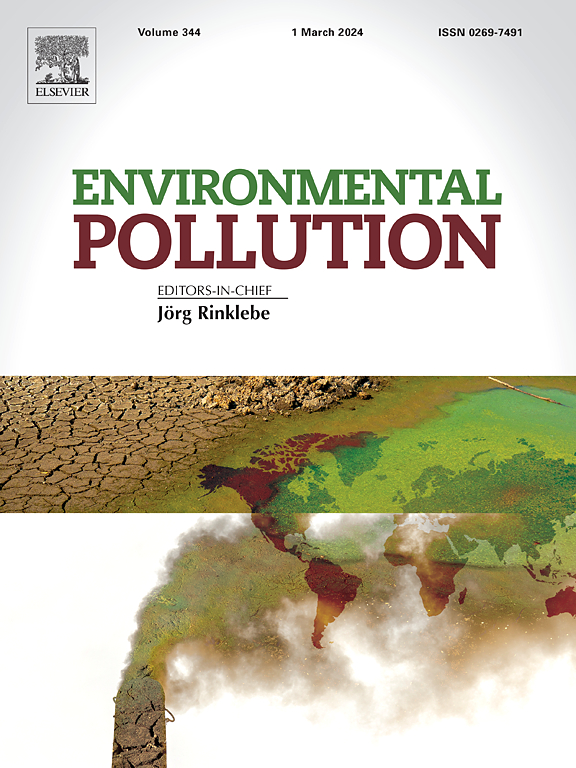Environmental stress responses to marine mucilage: Oxidative damage in economically important seafood from the Sea of Marmara
IF 7.6
2区 环境科学与生态学
Q1 ENVIRONMENTAL SCIENCES
引用次数: 0
Abstract
Marine mucilage, a gelatinous organic substance driven by nutrient enrichment and rising sea temperature, poses significant threats to marine biodiversity and fisheries. This study examines the oxidative stress responses in four seafood species: deep-water rose shrimp (Parapenaeus longirostris), common sole (Solea solea), European anchovy (Engraulis encrasicolus), and Atlantic horse mackerel (Trachurus trachurus) in Sea of Marmara, Türkiye, between September 2021 to April 2022. Biomarkers of oxidative stress—reduced glutathione (GSH), lipid peroxidation (LPO), and antioxidant enzyme activities (glutathione reductase, glutathione-S-transferase, and superoxide dismutase), were analyzed in muscle tissues to evaluate species-specific resilience to mucilage. Findings revealed distinct variations among species. Deep-water rose shrimp demonstrated the highest GSH level and lowest LPO level, indicating robust oxidative stress defense. In contrast, pelagic species, including European anchovy and Atlantic horse mackerel, exhibited decreased GSH and elevated LPO levels and variability antioxidant enzyme activities, reflecting greater sensitivity to environmental stress. During the marine mucilage, in addition to mucilage distribution, fluctuations in seawater temperature (between 7.4°C and 24.4°C), and physiological stress caused seasonal changes in various enzymatic activities of the fish species investigated in our study. These results highlight the risks posed by marine mucilage to seafood safety and the ecological balance of marine environments. The vulnerability of pelagic species, combined with their economic and nutritional importance, underscores the urgency of mitigation strategies. This study emphasizes the need for integrated “One Health” approaches to safeguard ecosystem health and food security in the region.


海洋粘液的环境应激反应:马尔马拉海重要经济海产品的氧化损伤
海洋粘液是一种由营养物质富集和海水温度上升驱动的胶状有机物质,对海洋生物多样性和渔业构成重大威胁。本研究在2021年9月至2022年4月期间,研究了四种海产品的氧化应激反应:深水玫瑰虾(Parapenaeus longirostris)、普通比目鱼(Solea Solea)、欧洲凤尾鱼(Engraulis encrasicolus)和大西洋马鲛鱼(Trachurus Trachurus)。研究人员分析了肌肉组织中氧化应激还原型谷胱甘肽(GSH)、脂质过氧化(LPO)和抗氧化酶活性(谷胱甘肽还原酶、谷胱甘肽s-转移酶和超氧化物歧化酶)的生物标志物,以评估物种对粘液的特异性恢复能力。研究结果揭示了物种之间的明显差异。深水玫瑰虾GSH水平最高,LPO水平最低,表明其抗氧化能力较强。相比之下,欧洲凤尾鱼和大西洋马鲛鱼等远洋鱼类的GSH水平下降,LPO水平升高,抗氧化酶活性变化,反映出对环境胁迫的敏感性更高。在海洋黏液分泌过程中,除了黏液分布、海水温度(7.4 °C - 24.4 °C)的波动和生理应激引起了我们研究的鱼类各种酶活性的季节性变化。这些结果凸显了海洋粘液对海产品安全和海洋环境生态平衡的风险。远洋物种的脆弱性,再加上它们在经济和营养方面的重要性,凸显了制定缓解战略的紧迫性。本研究强调需要采用“同一个健康”的综合方法来保障该地区的生态系统健康和粮食安全。
本文章由计算机程序翻译,如有差异,请以英文原文为准。
求助全文
约1分钟内获得全文
求助全文
来源期刊

Environmental Pollution
环境科学-环境科学
CiteScore
16.00
自引率
6.70%
发文量
2082
审稿时长
2.9 months
期刊介绍:
Environmental Pollution is an international peer-reviewed journal that publishes high-quality research papers and review articles covering all aspects of environmental pollution and its impacts on ecosystems and human health.
Subject areas include, but are not limited to:
• Sources and occurrences of pollutants that are clearly defined and measured in environmental compartments, food and food-related items, and human bodies;
• Interlinks between contaminant exposure and biological, ecological, and human health effects, including those of climate change;
• Contaminants of emerging concerns (including but not limited to antibiotic resistant microorganisms or genes, microplastics/nanoplastics, electronic wastes, light, and noise) and/or their biological, ecological, or human health effects;
• Laboratory and field studies on the remediation/mitigation of environmental pollution via new techniques and with clear links to biological, ecological, or human health effects;
• Modeling of pollution processes, patterns, or trends that is of clear environmental and/or human health interest;
• New techniques that measure and examine environmental occurrences, transport, behavior, and effects of pollutants within the environment or the laboratory, provided that they can be clearly used to address problems within regional or global environmental compartments.
 求助内容:
求助内容: 应助结果提醒方式:
应助结果提醒方式:


